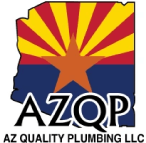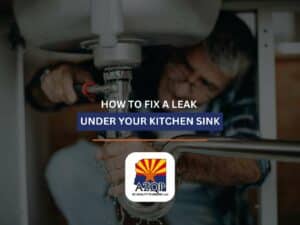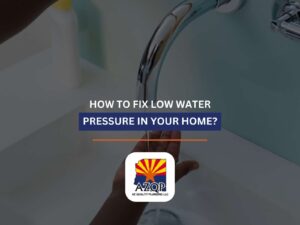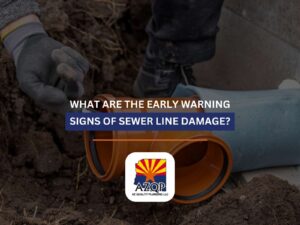What To Do If Your Water Heater Is Leaking: Causes, Risks & Next Steps
How To Identify The Source Of A Water Heater Leak
Few things are as concerning as discovering a leak in your water heater. For homeowners in Maricopa, where hard water and mineral buildup are common, even a small leak can quickly lead to property damage, electrical hazards, or unnecessary water loss. Understanding what is causing the issue and knowing how to respond can help protect your home and prevent more serious repairs.
Below, we explain everything you need to know to identify the source of a leak and how to prevent it in the future.
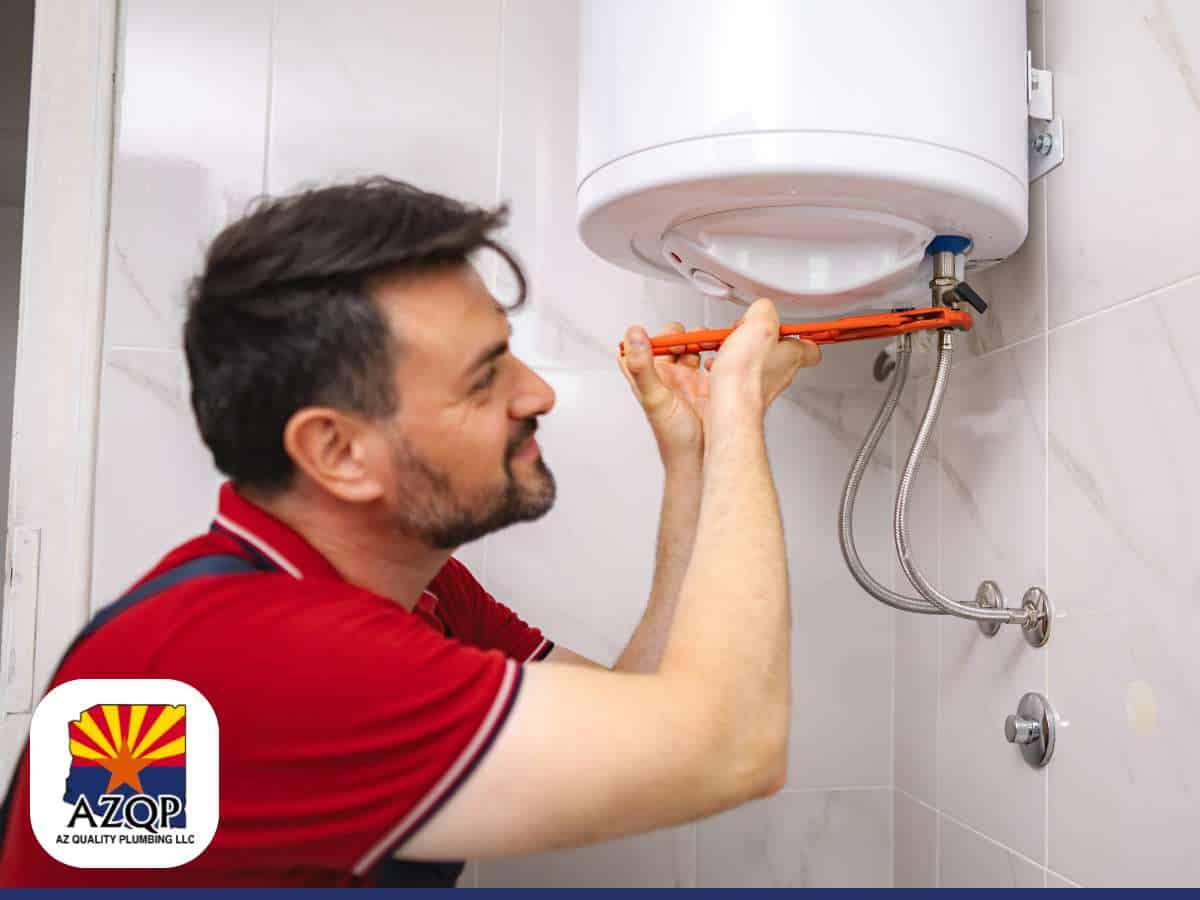
What The Location Of The Leak Can Tell You
Before assuming your water heater is leaking, it is important to confirm the source of the moisture. In some cases, what looks like a leak may simply be condensation. Dry the area thoroughly and monitor it. If water returns, you are likely dealing with an active leak. Placing paper towels around fittings and along the base of the unit can help pinpoint where the water is coming from.
Once the source is identified, the location of the leak can tell you a lot about how serious the issue is and whether professional repair is needed.
Top Of The Water Heater
Leaks at the top of the unit are commonly caused by loose or failing connections at the hot or cold water lines. Another frequent source is the temperature and pressure relief valve. While some of these issues are relatively simple to address, a leaking relief valve should never be ignored, as it can indicate excessive pressure inside the tank and poses a safety risk.
In many cases, tightening fittings or replacing a faulty valve resolves the issue, but persistent leaks should be evaluated by a plumber.
Bottom Of The Water Heater
Water collecting at the base of the tank is often a sign of a more serious problem. This typically indicates internal tank corrosion caused by normal wear over time. Once the tank itself begins to leak, replacement is usually the only long term solution.
In some situations, the issue may stem from a leaking drain valve, which can be repaired. However, if the water heater is older or the leak appears to be coming directly from the tank, immediate professional assessment is recommended. A licensed plumber in Maricopa can evaluate the condition of the unit and determine whether repair or replacement is the safest option.
Sides Of The Water Heater
Leaks appearing along the sides of the unit are less common but often more concerning. These may point to internal tank failure or cracks caused by corrosion. These issues are not visible from the outside and usually require professional diagnostic tools to confirm. In most cases, side leaks indicate that replacement is necessary.
Why The Age Of Your Water Heater Matters
The age of your water heater plays a major role in deciding whether repair or replacement is the safest option. If your water heater is over 8 to 10 years old and showing signs of leaking, corrosion, or reduced efficiency, replacement is often more cost-effective than repeated repairs. Older units are more likely to experience internal tank failure, which cannot be safely repaired and may lead to sudden water damage if left unaddressed.
Common Causes Of Water Heater Leaks
If you understand the causes of water heater leaks, you can prevent problems in the future. Learn about the main ones.
Faulty Drain Valve
Over time, drain valves can loosen or deteriorate, leading to slow leaks. While these may start small, they often worsen if left unaddressed. Replacing a worn drain valve is typically straightforward and can prevent larger water loss.
High Water Pressure Issues
When there is excessive pressure in the system, the heater has to work harder than it should. This increases the likelihood of water leaks or wear and tear on internal components. In these cases, you will also need water heater repair service.
Corrosion & Rust Damage
Corrosion is one of the most common causes of water heater failure. Rust weakens the tank walls and can create small fractures that are difficult to detect until leaking begins. Visible rust on the exterior or around fittings is often a sign that internal corrosion is already advanced and should be inspected by a professional.
Sediment Buildup Inside The Tank
Minerals in the water naturally settle at the bottom of the tank over time. This sediment buildup reduces efficiency and forces the heater to work harder, increasing internal temperatures. Prolonged overheating weakens the tank and can lead to leaks or premature failure if not addressed through regular maintenance.
Immediate Steps To Take When A Water Heater Is Leaking
You should not normalize this situation. If you act quickly, you could reduce the damage and risks of a leak in the water heater.
Turn Off The Power Supply
The first step is to immediately disconnect the power supply. This step applies to both gas and electric heaters. This will help you avoid more serious problems.
Shut Off The Water Supply
Now, close the cold water valve. This will prevent water from entering the system and avoid major problems.
Clean Up Standing Water Around The Heater
Next, you must remove the accumulated water from all areas. If there is electrical equipment nearby, prioritize keeping the surrounding area dry to avoid electrical problems.
Follow-Up Actions For Fixing A Leaking Water Heater
You have already assessed the initial situation. However, it is now time to evaluate whether a plumbing repair is necessary or if only minor adjustments are required.
Tightening Inlet & Outlet Connections
If there are small leaks, you can try carefully tightening loose connections. This can help extend the life of your equipment, as long as you do it in time. For this reason, it is essential to take action as soon as you notice the first signs of leakage.
Replacing A Faulty Drain Valve
Do you notice that the valve shows advanced wear? While a specialist will be able to assess what is best for you, in general, replacement is usually the best option. It is usually quite affordable and ensures a proper seal, preventing constant leaks.
Flushing The Water Heater Tank
It will also help to clean the inside of the tank, as you will be able to remove any sediment that has accumulated in the tank. This procedure will improve the performance of the heater, especially if you have noticed problems. It will also prevent structural damage.
How To Prevent Future Water Heater Leaks
If you want to avoid having to call a 24-hour plumber, it is essential to learn how to prevent these problems. Here are some key recommendations:
Routine Water Heater Maintenance
Good maintenance will solve problems before they get worse. In fact, you may never have any significant leaks if you do it regularly. Generally, it is a good idea to do it every few months.
Replacing The Anode Rod
This is a simple action that can yield noticeable results. Basically, the anode can protect the tank from corrosion. In fact, that is its function! If you replace it in time, you will be able to avoid irreversible internal damage.
Addressing Condensate Drain Hose Problems
If there is a clogged drain, unnecessary water accumulations can occur. It is essential to keep it clean at all times so that the flow is correct and leaks are prevented.
Spotting Inducer Assembly Issues Early
If you don’t want to have to call for water heater installation service again, it’s important to check the ventilation. Sometimes, the problem with leaks has to do with poor ventilation in the area. Fixing this will prevent you from having to replace the heater.
Preventing Condensate Pump Malfunctions
Finally, consider having the condensate pump checked regularly. This will allow you to prevent overflows, ensuring that the system drains properly.
Need Expert Water Heater Help? Trust The Experienced Plumbers At AZ Quality Plumbing
Is a leak causing you a lot of headaches, and you can’t deal with it on your own? Don’t worry anymore. Instead, leave it in the hands of our expert Maricopa plumbers at AZ Quality Plumbing.
We provide customized plumbing solutions designed to protect your investment and prevent long-term damage. Our team is available 24 hours a day, 7 days a week, to address water heater issues and urgent plumbing concerns. Contact us for prompt, reliable assistance when you need it most.
